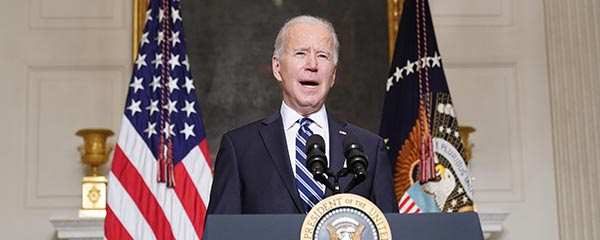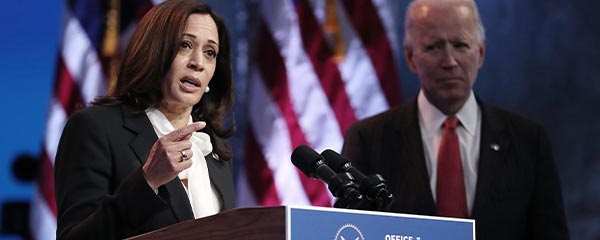Americans strongly approve of the idea of pumping even more government stimulus money into the U.S. economy. There is little indication that Americans are unduly worried about the impact of this unprecedented spending on the federal budget deficit.
The current stimulus plan working its way through Congress is the latest in a sequence of government efforts designed to mitigate the pandemic's economic consequences on Americans and the nation's small businesses. Several stimulus plans totaling trillions of dollars were signed into law last March as the coronavirus began to hammer the U.S. economy. These included the Coronavirus Preparedness and Response Supplemental Appropriations Act; the Families First Coronavirus Response Act; and the Coronavirus Aid, Relief and Economic Security (CARES) Act. President Donald Trump then signed the Consolidated Appropriations Act into law on Dec. 27, authorizing another $900 billion in stimulus checks and other relief measures.
Pew Research polling from last April showed that the CARES Act was widely approved by Americans, as was the case with the $800 billion American Recovery and Reinvestment Act passed in 2009 in the midst of the Great Recession. (As I wrote in an analysis in February 2009, "President Barack Obama signed the new $787 billion stimulus bill into law today in Denver with the general support of a majority of the American public.")
This history lends itself to an expectation of the same type of strong support for the current plan proposed by the Biden administration -- a plan that will cost up to $1.9 trillion and send $1,400 checks to large numbers of Americans. This, in fact, is what we find: All studies I have reviewed show strong majority support for the idea.
The most recent study, a Quinnipiac University poll, shows 68% of Americans supporting a "$1.9 trillion stimulus relief bill in response to the coronavirus pandemic," with 78% supporting the idea of $1,400 stimulus payments to Americans. Other polls in January and early February conducted by Pew Research and CBS News found even higher levels of support. Going back a bit further, a Franklin Templeton-Gallup study conducted in August found seven in 10 Americans saying they approved of the idea of "another one-time economic impact payment to all qualified adults (a direct payment to all qualified U.S. adults based on income level)."
The Deficit Not a Major Concern at This Point
All of this spending on stimulus plans will continue to increase the federal budget deficit, now the largest in history in absolute dollars (over $3 trillion) and the largest as a percentage of GDP since World War II. Some Republican leaders are beginning to push back on these huge deficits, even though the deficit underwent substantial increases under Republican President Donald Trump. But I do not see great immediate concern about the nation's negative balance sheet from the average American. Just 1% of Americans mentioned the federal debt or the federal budget deficit as the most important problem facing the U.S. in Gallup's latest January update, similar to the very low level of mentions that have been the case throughout the pandemic months.
Pew Research last summer found a drop in the percentage of Americans who said the federal budget deficit is a "very big problem" and neatly encapsulated the findings with this headline: "The U.S. budget deficit is rising amid COVID-19, but public concern about it is falling."
Pew Research also last month found that less than half of Americans say reducing the federal deficit should be a top priority for Congress and the president, in the bottom half among all of the 19 priorities tested. Notably, Pew found nearly twice as many Americans, 80%, saying that strengthening the economy should be a top priority, which of course is the aim of the stimulus legislation. Last fall, Gallup found the deficit was near the bottom of a list of issues the American public thought the presidential candidates should address. Gallup's "worry" update from a March 2-13, 2020, poll -- just as the coronavirus was coming into view as a devastating medical emergency -- showed that 44% of Americans worried a great deal about federal spending and the budget deficit, the lowest since Gallup began tracking this in 2011 when such worry was at 64%.
There have been times in Gallup's polling history when the deficit was considered the No. 1 problem facing the nation -- in July 1990 (21%) and in October 1990 (16%), a year when the deficit reached a near record (at the time, $220 billion), and again in January 1996 (28%), the latter being the highest percentage of mentions of the deficit as the top problem in Gallup's history. And reviews of polls conducted before the pandemic find Americans at that time did express concern about the deficit when asked about it directly. But, at this point in history, the deficit does not appear to be a top priority for the American public.
Desperate Times
Desperate times call for desperate measures, so it is said, and that sentiment has clearly been on the minds of government leaders who have passed trillions of dollars' worth of stimulus legislation since the pandemic began and who are poised to pass more such legislation in the next few weeks. To date, we find consistent evidence of majority support for these efforts from the American public, just as we did when similar stimulus plans were enacted during the Great Recession.
All of this government spending is increasing federal debt and the federal budget deficit to record-high levels. Americans have (seemingly realistic) low expectations that President Joe Biden will be able to substantially reduce the federal budget -- putting this possibility at the bottom of a list of 15 different potential Biden accomplishments that Gallup recently tested. But, and this is the key point, there is little evidence this matters to Americans. Plus, we know that congressional job approval rose after the passage of the March round of stimulus legislation, and congressional approval rose again in January after the passage of the December stimulus package. These upticks suggest that Americans are giving Congress credit for its spending, rather than dinging it for it (although with so much going on in the halls of Congress, it is impossible to establish direct causality).
All in all, it's clear that given a choice, Americans support stimulus spending even at the cost of not getting the national debt under control (indeed, that's what was found by a recent online panel survey conducted by Vox and the progressive think tank Data for Progress). The price tag of major government initiatives seems less important than these initiatives' potentially positive impact on Americans' lives.




